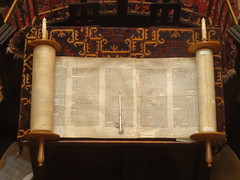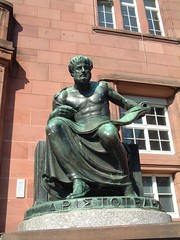World History Semester Exam Review
| 132560352 | Neolithic Revolution | When humans went from being nomad/hunter gatherers to settling in one place and farming. Also called: the Agricultural Revolution. |  |
| 132560353 | Theocracy | Government run by religious leaders. |  |
| 132560354 | Hammurabi | King of the Babylon and creator of the Code of Hammurabi, one of the world's oldest codes of law. |  |
| 132560355 | Cultural Diffusion | The spread of ideas, customs, and technologies from one people to another |  |
| 132560356 | Bronze | An alloy of copper and tin. |  |
| 132560357 | Shang Dynasty | Dynasty in china that established the Mandate of Heaven. |  |
| 132560358 | Torah | First five books of the Hebrew Scripture and the first five book of the Christian Bible. |  |
| 132560359 | Socrates | Greek philosopher who developed Socratic Method (questioning). He was sentenced to death for corrupting Athens' young people. Socrates was a teacher of Plato. |  |
| 132560360 | Monotheism | Belief in one God |  |
| 132560361 | Aristotle | Greek philosopher who was a student of Plato, and a tutor of Alexander the Great. |  |
| 132560362 | Harappans | People of Indus vvalley civilization who lived in well planned grid-like cities. | |
| 132560363 | Oracle Bone | Animal bone or tortoise shell used by ancient Chinese priests to communicate with the gods |  |
| 132560364 | Ten Commandments | Laws to live by that were given to Moses |  |
| 132560365 | Covenant | Agreement between God and his people in which God makes certain promises and requires them to follow the his Ten Commandments | |
| 132560366 | Diaspora | Scattering of people. (Image above shows the movement of people for New Orleans after Hurricane Katrina. This was Diaspora. |  |
| 132560367 | Sparta | Ancient Greek polis known for military might. Ruled by an oligarchy, focused on military, used Helots (slaves) for agriculture, and discouraged the arts. |  |
| 132560368 | Qin Dynasty | After the Zhou Dynasty in 221 BC (end of the Warring States Period). Founded by Qin Shi Huangdi who helped reorganize China into large provinces; started building the Great Wall; developed strong military; and introduced the census. Terracotta Soldiers were built for Qin Shi Huangdi to command in the after-life. |  |
| 132560369 | Zhou Dynasty | Longest lasting imperial dynasty of China from 1122 to 221 BC, displaced Shang Dynasty claming the Mandate of Heaven Alliances with regional princes and families (feudal system); overtook Yangtze River Valley (Middle Kingdom); Mandarin Chinese language; Confucious (philosopher). |  |
| 132560370 | Mesopotamia | first civilization located between the Tigris & Eurphrates Rivers in present day Iraq; term means "land between the rivers;" Sumerian culture |  |
| 132560371 | Civil Service | Civil examinations based on teachings of Confucius and were held during the Han Dynasty. People who passed those exams could work for the government. They only selected few who were highly educated. Only high class people took these exams because they were the only who knew characters and words. So basically high-class people became part of the government, and this cycle repeated and repeated again. |  |
| 132560372 | Abraham | Founder of Judaism who, according to the Bible, led his family from Ur to Canaan in obedience to God's command. |  |
| 132560373 | Geography of Greece | Includes about 2000 islands in the Aegean and Ionian seas. Three-fourths of land covered by mountains. Greece had many high, steep rocky mountains, therefore the city-states in Greece are all isolated from one another. There were many islands, used the sea to trade grapes, olives, and nuts. These were grown to trade, even though there was a shortage of farmland. |  |

